You’ll find exceptional meditation timers in Headspace and Calm, both offering 4.5+ star ratings with customizable 5-30 minute sessions. FitMind provides neuroscience-based content with wearable analytics, while Meditation Studio integrates with Muse headbands for real-time EEG biofeedback. Your Apple Watch’s built-in Mindfulness app delivers Breathe and Reflect sessions with heart rate variability tracking. These top-rated options feature flexible scheduling, progress tracking, and stress monitoring that adapts to your daily routine, helping you discover which advanced features will transform your mindfulness practice.
Top-Rated Smartwatch Meditation Apps for Stress Management
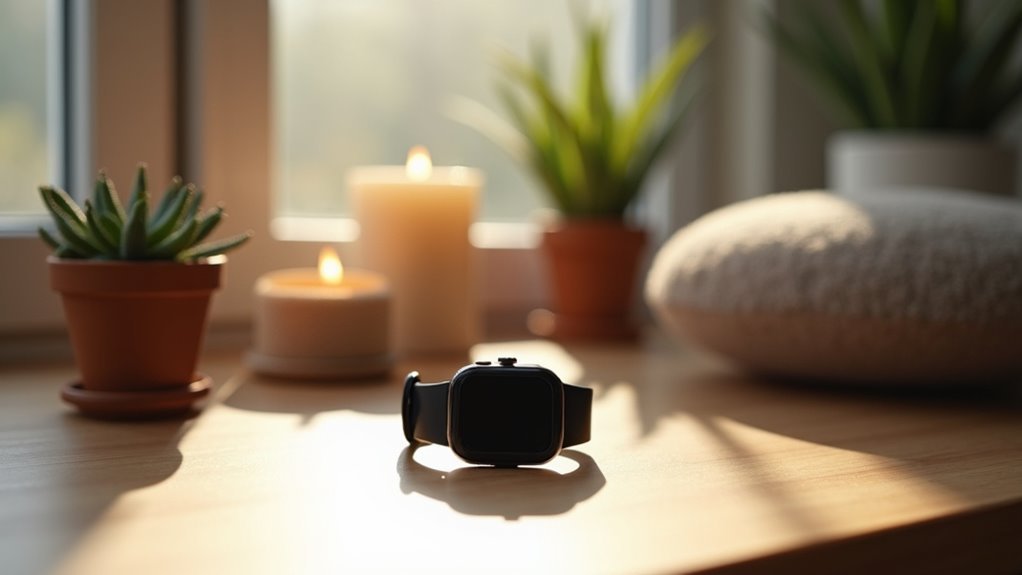
Smartwatch meditation apps transform stress management into a wrist-accessible practice that fits seamlessly into your daily routine.
Leading options like Headspace and Calm dominate both Wear OS and Apple Watch ecosystems, offering beginner-friendly guidance with 4.5+ star ratings. FitMind’s gaining traction through neuroscience-based content and wearable analytics, while Meditation Studio integrates with Muse headbands for real-time biofeedback.
Top-rated meditation apps like Headspace and Calm lead smartwatch platforms while innovative options offer advanced biofeedback integration.
These apps excel with customizable 5-10 minute sessions, background soundscapes, and progress tracking visible on your wrist. You’ll receive gentle reminder notifications and personalized feedback based on heart rate and stress levels. Many apps include mood check-ins that analyze your emotional state and recommend specific meditation sessions tailored to your current needs.
Over 80% of users report measurable stress reduction after four weeks, with regular smartwatch users meditating 20% more frequently than traditional app users.
Essential Timer Features Every Mindfulness Wearable Should Have
While choosing the right meditation app matters, your wearable’s underlying timer capabilities determine whether you’ll maintain a consistent mindfulness practice.
You need flexible session lengths, from quick 1-minute breaks to extended 30+ minute sessions. Real-time biofeedback through EEG sensors and heart rate variability tracking provides immediate audio or haptic alerts when your attention drifts. Customizable scheduling lets you create repeating sessions throughout your day for habit formation.
Progress tracking stores your session history, displaying streak counts and comparative analytics on stress reduction. Your wearable should sync guided content with biometric feedback for personalized experiences. Advanced devices use functional near-infrared spectroscopy to monitor prefrontal cortex activity during meditation sessions, providing more precise feedback about your brain’s response to mindfulness practices.
Essential hardware features include long battery life, Bluetooth connectivity, lightweight comfort, quick-charge capability, and water resistance. These timer foundations guarantee you’ll actually use your device consistently rather than abandoning it after initial enthusiasm fades.
Comparing Built-in Meditation Tools Across Leading Smartwatch Brands
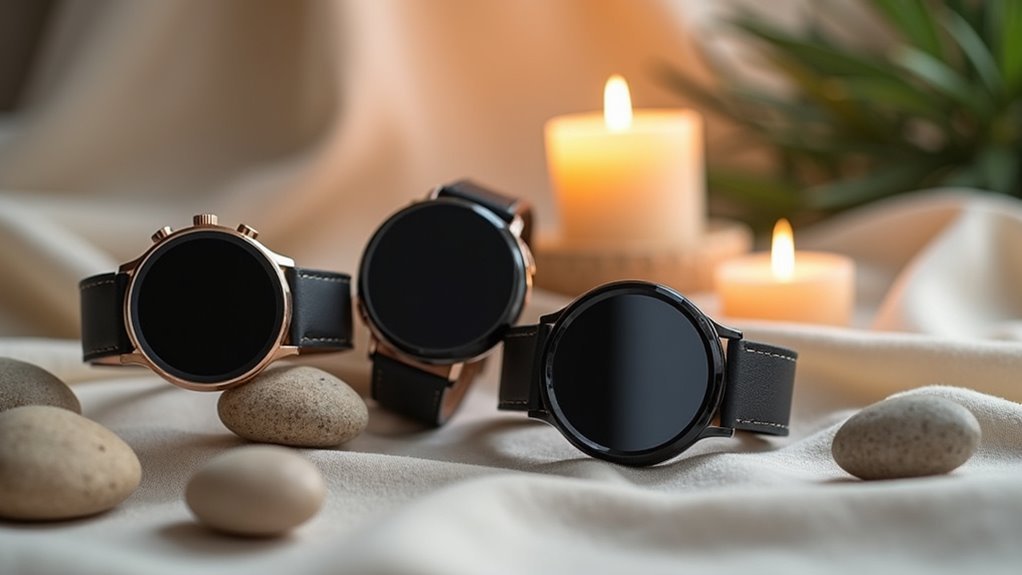
Each major smartwatch manufacturer takes a distinct approach to meditation functionality, and understanding these differences helps you choose the device that’ll best support your mindfulness goals.
Apple Watch Ultra 2 excels with its Mindfulness app featuring Breathe and Reflect sessions, plus seamless HRV tracking integration.
Garmin Vivoactive 5 stands out with real-time respiration monitoring and Body Battery energy assessment that prompts relaxation when needed. The superior battery life of dedicated Garmin devices ensures consistent meditation tracking without frequent charging interruptions.
Fitbit smartwatches offer ambient soundscapes during sessions and incorporate meditation data into daily readiness scores.
Samsung Galaxy Watch leverages Calm app integration through Samsung Health, providing professional guided content with extensive stress tracking via heart rate variability.
Each platform syncs detailed session data for long-term progress analysis.
Advanced Stress Tracking Capabilities in Modern Fitness Watches
Beyond basic heart rate monitoring, today’s fitness watches employ sophisticated sensor arrays that detect stress through multiple physiological pathways. Continuous Electrodermal Activity (cEDA) sensors track electrical changes on your skin related to sweat secretion, while Heart Rate Variability (HRV) monitoring reveals your autonomic nervous system’s balance.
These devices combine heart rate, sleep data, skin temperature, and motion sensors to generate thorough stress scores on 0-100 scales.
You’ll receive real-time alerts prompting mood logging when stress spikes occur, helping correlate physiological changes with emotional states. Modern watches like Garmin’s vívoactive 5 integrate stress tracking with Body Battery energy monitoring, combining sleep, activity, and recovery data.
While accuracy varies—some detecting changes within minutes, others experiencing delays—these passive monitoring systems provide valuable insights for managing your mental health and recognizing persistent stress patterns. Understanding personal baselines becomes crucial for interpreting these stress measurements effectively and achieving better stress management outcomes.
Customizable Mindfulness Settings for Optimal Wearable Performance
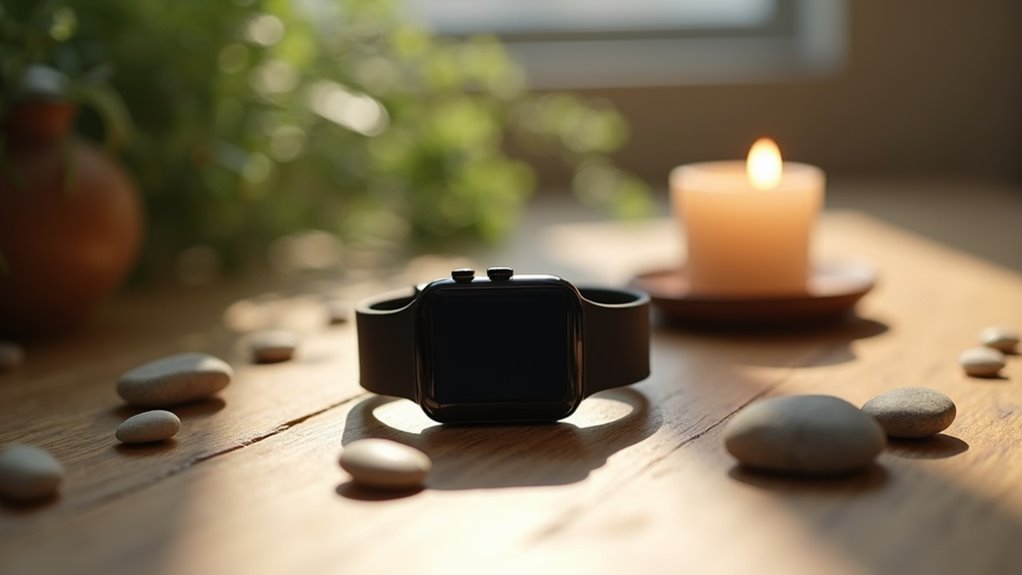
Smart wearables transform raw stress data into actionable mindfulness solutions through highly customizable settings that adapt to your unique physiological patterns and lifestyle demands.
You can adjust session lengths through apps like Breethe and Headspace based on your schedule, while breathing patterns sync with real-time heart rate variability from devices like Apple Watch or Fitbit.
The Muse S headband provides EEG-based biofeedback with auditory cues to enhance focus during meditation. You’ll receive personalized ambient sounds and meditation topics from Insight Timer’s extensive library.
AI algorithms automatically adjust session content when your wearable detects elevated stress or low energy levels, ensuring ideal timing and effectiveness for your mindfulness practice. These adaptive features help users achieve a 40% decrease in self-reported stress levels through personalized breath control techniques that respond to individual physiological feedback.
Frequently Asked Questions
Are Meditation Timer Apps Free or Do They Require Subscription Fees?
You’ll find meditation timer apps offer both free and subscription options. Insight Timer provides extensive free content, while Calm requires paid subscriptions. Pocket Meditation Timer offers basic features without fees, giving you flexible choices.
Can Meditation Timers Help Improve Sleep Quality and Reduce Anxiety?
Yes, you’ll find meditation timers can notably improve your sleep quality and reduce anxiety. They help you establish consistent practice routines, maintain focus during sessions, and create structured mindfulness habits that reduce stress.
How Many Guided Meditations Are Typically Available in Popular Timer Apps?
You’ll find vast differences in guided meditation libraries across popular apps. Insight Timer offers over 150,000 free sessions, while Headspace provides around 100+ structured meditations, and Calm contains roughly 50-100 curated tracks.
Do Meditation Timer Apps Work on Both Iphone and Android Devices?
You’ll find most meditation timer apps work on both iPhone and Android devices. Popular options like Insight Timer offer cross-platform compatibility, though some apps remain exclusive to one operating system.
What’s the Difference Between Insight Timer and Other Meditation Apps?
Unlike other meditation apps, Insight Timer offers you over 150,000 free meditations, a massive teacher network of 3,000+ contributors, live sessions, and specialized content including 10,000+ children’s tracks without requiring subscriptions.

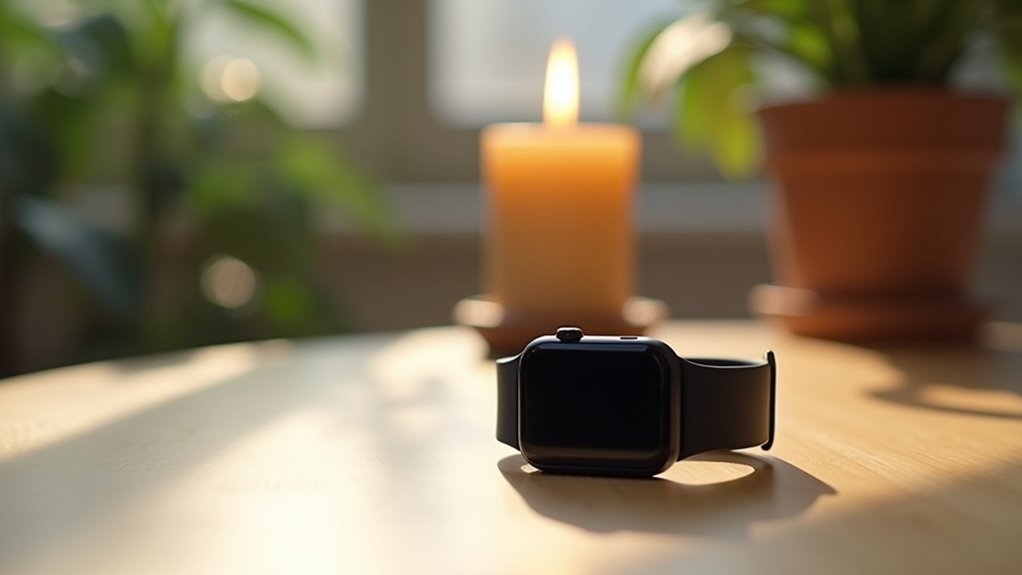
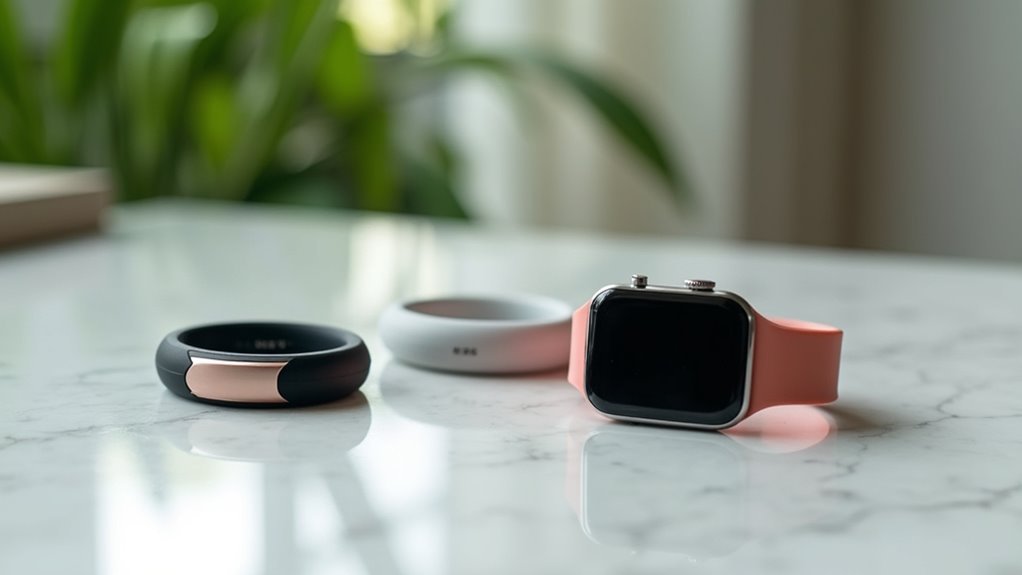
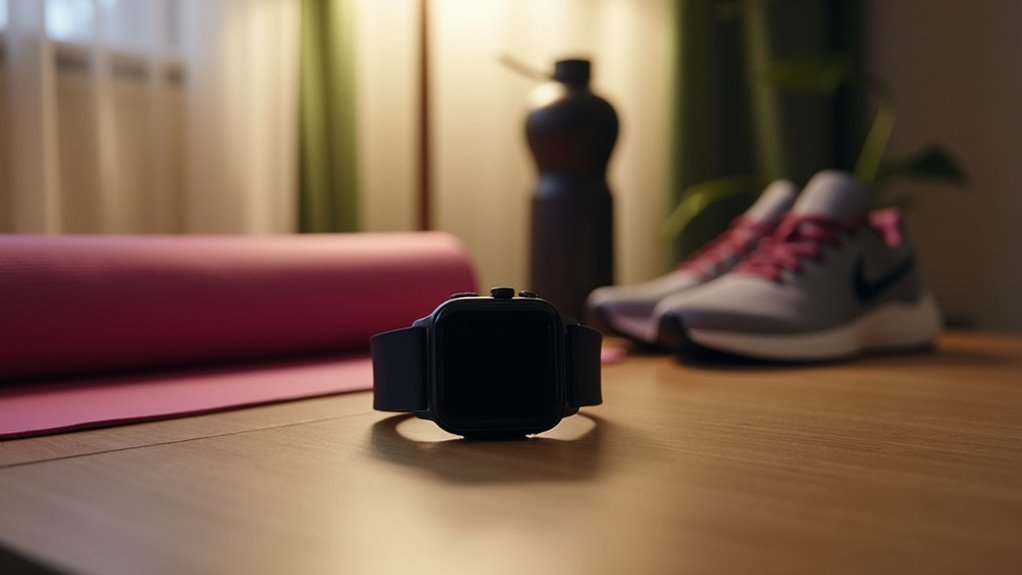
Leave a Reply